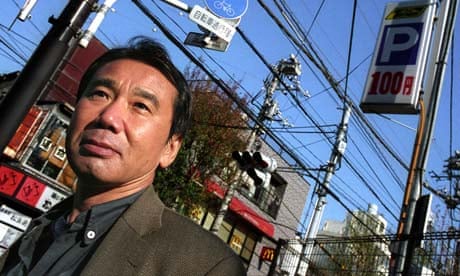The 1995 nerve gas attacks on the Tokyo subway by the Aum Shinrikyo cult gave rise to Haruki Murakami's first non-fiction work, Underground, and now the novelist has admitted that they also inspired his new novel 1Q84.
The book was published in Japan last month to huge anticipation – Murakami had refused to reveal the plot after leaked details about his 2002 novel Kafka on the Shore were said to have spoiled its impact. Speculation had suggested that the title revealed an Orwellian influence – the letter Q is a homonym for the number nine in Japanese, pronounced "kyuu"; other rumours claimed it was a tribute to the Chinese writer Lu Xun's novella The True Story of Ah Q.
Murakami has now admitted that he had "long wanted to write a near-past novel similar to George Orwell's futuristic novel 1984" and that this was one of the inspirations for the book. Another was the series of interviews with Aum victims which he conducted following the 1995 gas attacks, and published as Underground.
"My indignation against the incident remains undiminished. But my interest was piqued by Yasuo Hayashi, who is on death row. He fled after killing eight people, the biggest number, in the Tokyo subway attack. Hayashi joined Aum without knowing exactly what he was getting into and committed murder after being brainwashed," Murakami told Japanese paper the Yomiuri Shimbun. "I think capital punishment is the reasonable decision when we consider Japan's penalty system and bereaved families' anger and sorrow. But I fundamentally oppose capital punishment, and I felt a heavy sense of gloom when the death sentence was given. At that time I imagined the terror of being left alone on the other side of the moon where a Joe Blow unwittingly commits a felonious crime and ends up becoming a death row convict. I considered for years the meaning of this. This served as a starting point for my story."
The two-part 1Q84 follows the story of a school teacher who has dreams of becoming a novelist, Tengo, and a single woman, Aomame, who works for a gym. Their lives are told in the third person in alternating chapters, as they search for each other aged 30 after parting at the age of 10. Running to 1,000-odd pages, the book also deals with cults – Tengo becomes fascinated by a girl who has escaped from a cult – rape and domestic violence. It proved an instant bestseller in Japan when it was published at the end of May, but there is no word yet about when an English translation will be forthcoming.
Murakami said it took him two years to write the novel, after he started it during a stay in Hawaii in autumn 2006. At that point, he had only two thoughts in his mind: that the book would be about a man and woman searching for each other, and that he'd make "this simple story as long and complicated as possible". "In my case, if I start out by thinking about the plot, things don't go well. Small points, such as my impression of what is likely to occur, do come to mind, but I let the rest of the story take its own course. I don't want to spend as long as two years writing a story whose plot I already know," he said.
He'd also wanted to "delve deeper into how women feel or think" in this latest novel, and admitted that violence and sex had "become more important issues" for him over his 30-year writing career. "These two elements can be described as important doors for entering deep inside the human soul," he said. "Peeling away human skin, chopping off a cat's head ... This latest novel doesn't have such cruel descriptions in it, but there are a considerable number of sex-related scenes. This may be a real turn-off for some people, but it's necessary in this story."
Although 1Q84 has already sold almost 1.5m copies in Japan, Murakami said that "what counts isn't the number of copies a book sells but how the novelist's messages can reach the readers".
